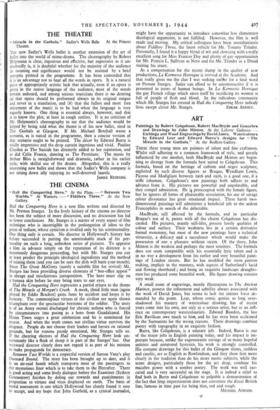THE CINEMA
" Hall the Conquering Hero." At the Plaza.—" Between Two Worlds." At Warners. — " Fiddlers Three." At the New
Gallery. •
Hail the Conquering Hero is a new film written and directed by Mr. Preston Sturges. In the lively history of the cinema no director has been the subject of more discussion, and no discussion has led to fewer conclusions. Mr. Sturges is -a master of every aspect of film technique who is incorrigible in the prolongation of jokes to the point of tedium, whose cynicism is rivalled only by his sentimentality. One thing only is certain. No director in Hollywood's history has before succeeded in putting the unmistakable mark of his per- sonality on such a long, unbroken series of pictures. To appraise a film in advance simply on the reputation of its director is a notoriously dangerous proceeding, but with Mr. Sturges you can at least predict the principle ideological ingredients and the method of mixing them (and you can be sure the dish will burn your mouth). Since The Great McGinty (surely a suitable film for revival) Mr. Sturges has been providing diverse elements of " box-office appeal " in abrupt and mischievous juxtaposition. The hero must slip on a banana skin before he may bring tears to our eyes.
Hail the Conquering Hero represents a partial return to the theme of The Miracle of Morgan's Creek. A meek, timid little man (again played by Eddie Bracken) gains fame by accident and keeps it by honesty. The commonplace virtues of the civilian are again shown triumphant over the spectacular heroisms of the soldier. The story is of an Army recruit discharged for chronic asthma who is forced by circumstances into posing as a hero from Guadalcanal. His Home Town stages a great celebration and he is nominated for mayor. And when the truth comes out civilian virtue survives the disgrace. People do not choose their leaders and heroes on rational grounds, but for reasons purely emotional, Mr. Sturges tells us. If the cheering electors of Hail the Conquering Hero look un- commonly like a flock of sheep it is part of the Sturges' fun. Our wayward director clearly does not regard it as part of his mission to make propaganda for democracy. Between Two Worlds is a respectful version of Sutton Vane's play Outward Bound. The story has been brought up to date, and it is an air-raid bomb which transports most of the passengers to the mysterious liner which is to take them to the Hereafter. There is good acting and some lively dialogue before the Examiner (Sydney Greenstreet) finishes by doling out rewards and punishments in proportion to virtues and vices displayed on earth. The basis of moral assessment is one which Hollywood has dearly found it easy to accept, and my hope that John Garfield, as a cynical journalist,
might have the opportunity to introduce somewhat less elementary theological arguments, is not fulfilled. However, the film is well made and moving. My. critical colleagues have been unenthusiastic about Fiddlers Three, the latest vehicle for Mr. Tommy Trinder. Personally, I found it a happy blend of wit and clowning with a really excellent song for Miss Frances Day and plenty of gay opportunities for Mr. Francis L. Sullivan as Nero and for Mr. Trinder as a Druid visiting his court.
As a compensation for the recent slump in the quality of new productions, La Kermesse Heroique is revived at the Academy. And that really gives me the clue I was seeking earlier for a final word on Preston Sturges. Satire can afford to be unconstructive if it is presented in terms of human beings. In La Kermesse Heroique the gay French village which saves itself by sacrificing its women is full of people of flesh and blood. In the ridiculous community which Mr. Sturges has created in Hail the Conquering Hero nobody


























 Previous page
Previous page